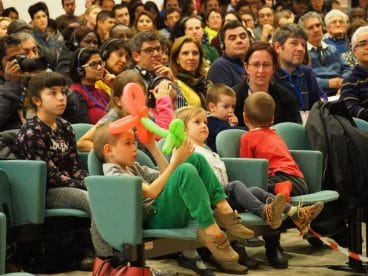
Apr 21, 2017 | Focolare Worldwide
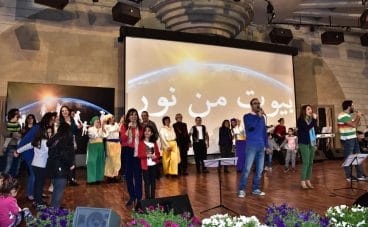 Every year, spring blossoms a few days earlier in order to remember Chiara Lubich. March 14th is celebrated with a variety of new and annual events in every part of the world, each with a style all its own to remember the Focolare foundress on the anniversary of her death – or better – her birth to Heaven that happened in 2008. In 2017 this special day was interwoven with another event, the 50th anniversary of the New Families, which is a branch of the Focolare Movement that embraces 800 thousand families from around the world who strive to live the spirituality of unity and spread values of universal brotherhood in their local environments. The powerful title, Chiara Lubich and the Family, was meant to express the special care and attention the foundress gave to a “daring, beautiful and demanding” calling whose “immeasurable and precious values could change the world and transform it into a family, if those same values were applied to humankind.” “Here, in front of you, I seem to see Jesus who looks at the world, looks at the crowds and pities them,” Chiara Lubich had said in her historic founding address on July 19, 2967. “Because, of all the portions of the world, the most broken part has been placed on your shoulders, the part most like Jesus Forsaken. (…) May this pity not remain at the level of the sentiments, but be transformed into works.”
Every year, spring blossoms a few days earlier in order to remember Chiara Lubich. March 14th is celebrated with a variety of new and annual events in every part of the world, each with a style all its own to remember the Focolare foundress on the anniversary of her death – or better – her birth to Heaven that happened in 2008. In 2017 this special day was interwoven with another event, the 50th anniversary of the New Families, which is a branch of the Focolare Movement that embraces 800 thousand families from around the world who strive to live the spirituality of unity and spread values of universal brotherhood in their local environments. The powerful title, Chiara Lubich and the Family, was meant to express the special care and attention the foundress gave to a “daring, beautiful and demanding” calling whose “immeasurable and precious values could change the world and transform it into a family, if those same values were applied to humankind.” “Here, in front of you, I seem to see Jesus who looks at the world, looks at the crowds and pities them,” Chiara Lubich had said in her historic founding address on July 19, 2967. “Because, of all the portions of the world, the most broken part has been placed on your shoulders, the part most like Jesus Forsaken. (…) May this pity not remain at the level of the sentiments, but be transformed into works.” 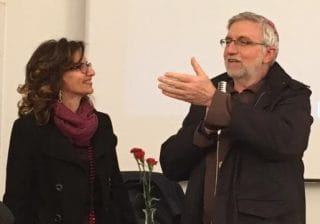 Works that can now be seen: cultural projects, support for minors, seminars for families, help for separated couples, social and educaitonal projects that highlight universal family values from within the great human family. Concrete action is the main characteristic of a family, the basic cell of society, and this was strongly underscored in the two Synods that dealt with the topic of the family. The contents of those Synods then came together in Pope Francis’s Apostolic Exhortation, The Joy of Love. The joy of love that the pope speaks of is well represented by the thousands of voices and it is on the faces of the people and families that converged on Loppiano, Italy, from all five continents last March to attend the event, three days to learn the art of reciprocity. “Married life is like a ship,” one family from Peru commented, “if you try to row by yourself it takes a lot of effort.” It is the art of loving that gives strength to the family to regenerate, through trust, forgiveness, individual responsibility, creativity, acceptance and supportiveness.
Works that can now be seen: cultural projects, support for minors, seminars for families, help for separated couples, social and educaitonal projects that highlight universal family values from within the great human family. Concrete action is the main characteristic of a family, the basic cell of society, and this was strongly underscored in the two Synods that dealt with the topic of the family. The contents of those Synods then came together in Pope Francis’s Apostolic Exhortation, The Joy of Love. The joy of love that the pope speaks of is well represented by the thousands of voices and it is on the faces of the people and families that converged on Loppiano, Italy, from all five continents last March to attend the event, three days to learn the art of reciprocity. “Married life is like a ship,” one family from Peru commented, “if you try to row by yourself it takes a lot of effort.” It is the art of loving that gives strength to the family to regenerate, through trust, forgiveness, individual responsibility, creativity, acceptance and supportiveness.  The event at Loppiano was the pivot point for many other events around the world, beginning with last year’s January 27th inaugural event in Cairo, Egypt, and then for many successive events in Panama, Croatia, Italy, Uganda, Tanzania, USA, Brazil, France, Kenya, Panama, Lithuania, Australia, Belgium, Canada, Burundi, Singapore, and more. Practical experiences were presented and seminars on the themes of education, the relationship of the married couple, acceptance, stories from daily life and hidden acts of heroism in war zones, solidarity in moments of difficulty, support for disadvantaged populations, together with workshops, shows, festivals and public prayer services. Although it is difficult to list them all and describe the main characteristic of each one, it would be impossible not to recognize in these festive family gatherings in collaboration with other movements, Church, Religious and civil institution representatives –“seeds of communion for the people of the Third Millennium,” which were prophetically foretold by Chiara Lubich in 1993.
The event at Loppiano was the pivot point for many other events around the world, beginning with last year’s January 27th inaugural event in Cairo, Egypt, and then for many successive events in Panama, Croatia, Italy, Uganda, Tanzania, USA, Brazil, France, Kenya, Panama, Lithuania, Australia, Belgium, Canada, Burundi, Singapore, and more. Practical experiences were presented and seminars on the themes of education, the relationship of the married couple, acceptance, stories from daily life and hidden acts of heroism in war zones, solidarity in moments of difficulty, support for disadvantaged populations, together with workshops, shows, festivals and public prayer services. Although it is difficult to list them all and describe the main characteristic of each one, it would be impossible not to recognize in these festive family gatherings in collaboration with other movements, Church, Religious and civil institution representatives –“seeds of communion for the people of the Third Millennium,” which were prophetically foretold by Chiara Lubich in 1993.
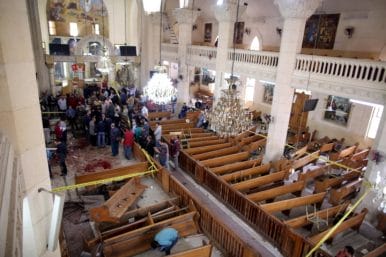
Apr 10, 2017 | Focolare Worldwide
 “It’s an attack not just on Christians but on religion as well,” commented the members of the local Focolare community in Egypt, with reference to the bombings on Palm Sunday. This sentiment was confirmed through the immediate solidarity shown by the Muslim community, many of whom offered to donate blood at the hospitals. “Being deeply religious people, Muslims and Christians in Egypt felt called upon to strengthen their faith after the attacks,” a member of the Movement said. Two Coptic Christian churches were targetted by terrorists in the city of Tanta in the Nile Delta, and in Alexandria, the second largest city of the North African country. In Tanta the Church of St George was hit causing 27 casualties. In Alexandria, Church of St Mark was bombed killing 18 people. The President of Egypt, Abdel Fattah al-Sisi has declared a three-month state of emergency, during which all public manifestations and events will be suspended, among other restrictions. The attacks coincided with the celebration of Palm Sunday, which marks the start of the most important liturgical week for Christians. It was a sombre beginning to Holy Week. The passage of Revelation came to mind which describes a “great multitude (…) from every nation (…) holding palm branches in their hands” who had “washed their robes in the blood of the Lamb (…)”. (Revelation 7:9-14). On Sunday morning, at St Peter’s Square, the Holy Father prayed “for the victims”, expressing his condolences “to my dear brother, Pope Tawadros II, the Coptic Church and the entire Egyptian nation.” And he concluded: “May the Lord convert the hearts of those who sow terror, violence and death.”
“It’s an attack not just on Christians but on religion as well,” commented the members of the local Focolare community in Egypt, with reference to the bombings on Palm Sunday. This sentiment was confirmed through the immediate solidarity shown by the Muslim community, many of whom offered to donate blood at the hospitals. “Being deeply religious people, Muslims and Christians in Egypt felt called upon to strengthen their faith after the attacks,” a member of the Movement said. Two Coptic Christian churches were targetted by terrorists in the city of Tanta in the Nile Delta, and in Alexandria, the second largest city of the North African country. In Tanta the Church of St George was hit causing 27 casualties. In Alexandria, Church of St Mark was bombed killing 18 people. The President of Egypt, Abdel Fattah al-Sisi has declared a three-month state of emergency, during which all public manifestations and events will be suspended, among other restrictions. The attacks coincided with the celebration of Palm Sunday, which marks the start of the most important liturgical week for Christians. It was a sombre beginning to Holy Week. The passage of Revelation came to mind which describes a “great multitude (…) from every nation (…) holding palm branches in their hands” who had “washed their robes in the blood of the Lamb (…)”. (Revelation 7:9-14). On Sunday morning, at St Peter’s Square, the Holy Father prayed “for the victims”, expressing his condolences “to my dear brother, Pope Tawadros II, the Coptic Church and the entire Egyptian nation.” And he concluded: “May the Lord convert the hearts of those who sow terror, violence and death.”
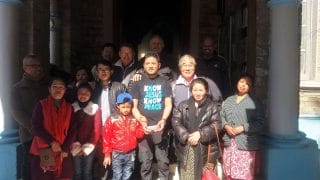
Apr 4, 2017 | Focolare Worldwide
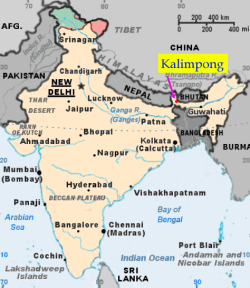 The Kalimpong focolare in West Bengal, India, opened September 9 when three focolarini moved to the house offered by Monsignor Stephen Lepcha, bishop of the Darjeeling diocese. At an altitude of 1,250 meters above sea level, Kalimpong is at the center of the diocese. The other major cities (Darjeeling, Kurseong, Siliguri, Sikkim) can all be reached within a couple of hours, as can the countries of Nepal and Bhutan. “Ever since the beginning of June we had been traveling to that region to search for a house that would be good for a focolare centre,” says Vivek from India. “The bishop offered us the one in Kalimpong. “While we were waiting the past few months, there were a number of opportunities to meet groups of young people in schools and parishes, families, priests, men and women religious, as well as others involved in interreligious dialogue. We offered everyone the spirituality of unity that we try to live. “The bishop, in fact, considers the Focolare Movement, along with his own spirituality, a ‘need of the hour’ to renew the Christian community in his diocese and the fabric of relationships in local society.”
The Kalimpong focolare in West Bengal, India, opened September 9 when three focolarini moved to the house offered by Monsignor Stephen Lepcha, bishop of the Darjeeling diocese. At an altitude of 1,250 meters above sea level, Kalimpong is at the center of the diocese. The other major cities (Darjeeling, Kurseong, Siliguri, Sikkim) can all be reached within a couple of hours, as can the countries of Nepal and Bhutan. “Ever since the beginning of June we had been traveling to that region to search for a house that would be good for a focolare centre,” says Vivek from India. “The bishop offered us the one in Kalimpong. “While we were waiting the past few months, there were a number of opportunities to meet groups of young people in schools and parishes, families, priests, men and women religious, as well as others involved in interreligious dialogue. We offered everyone the spirituality of unity that we try to live. “The bishop, in fact, considers the Focolare Movement, along with his own spirituality, a ‘need of the hour’ to renew the Christian community in his diocese and the fabric of relationships in local society.” 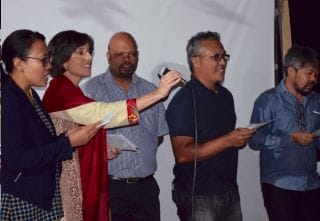 “There was a lot of hospitality as soon as we opened the focolare,” adds Rey, who is from the Philippines. “Both our Focolare community in India and local people filled us to the brim, with goods of every kind for the focolare and food for the first few days. For us it was a sign of God blessing this new project.” The night before inaugurating the new focolare house, the women focolarine of Dehli brought rosaries that had been blessed by Pope Francis. “Having received these presents, one of us thought of giving his to someone else. Another of us did not like that idea, and the situation became a bit tense. What to do? We certainly could not begin the focolare the next day if there was not unity and harmony among us. “So stayed together past midnight in order to clear up the misunderstanding. In this way we reestablished unity and the spiritual presence of Jesus in our midst, which is worth much more than all the various preparations, even if those need to be done well too.”
“There was a lot of hospitality as soon as we opened the focolare,” adds Rey, who is from the Philippines. “Both our Focolare community in India and local people filled us to the brim, with goods of every kind for the focolare and food for the first few days. For us it was a sign of God blessing this new project.” The night before inaugurating the new focolare house, the women focolarine of Dehli brought rosaries that had been blessed by Pope Francis. “Having received these presents, one of us thought of giving his to someone else. Another of us did not like that idea, and the situation became a bit tense. What to do? We certainly could not begin the focolare the next day if there was not unity and harmony among us. “So stayed together past midnight in order to clear up the misunderstanding. In this way we reestablished unity and the spiritual presence of Jesus in our midst, which is worth much more than all the various preparations, even if those need to be done well too.” 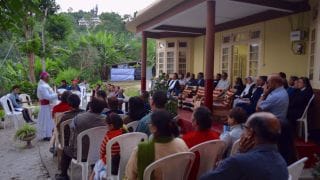 During the inauguration, the Apostolic Nuncio said he hoped “that the new focolare house may be an instrument in God’s hands to fulfill the ideals and the spirituality of the Focolare Movement.” The bishop gave his blessing to the close to 50 people present, emphasizing the focolare’s contribution in the field of interfaith dialogue and its witness to the Gospel through life. In January two of the focolarini were invited by Monsignor Vincent Aind, of the nearby diocese of Bagdogra, to present some spiritual points at a retreat for priests. “The theme was around Jesus’ public ministry, particularly his attitude toward foreigners. It was an opportunity to propose our dynamic way of building relationships in society based on the Gospel.”
During the inauguration, the Apostolic Nuncio said he hoped “that the new focolare house may be an instrument in God’s hands to fulfill the ideals and the spirituality of the Focolare Movement.” The bishop gave his blessing to the close to 50 people present, emphasizing the focolare’s contribution in the field of interfaith dialogue and its witness to the Gospel through life. In January two of the focolarini were invited by Monsignor Vincent Aind, of the nearby diocese of Bagdogra, to present some spiritual points at a retreat for priests. “The theme was around Jesus’ public ministry, particularly his attitude toward foreigners. It was an opportunity to propose our dynamic way of building relationships in society based on the Gospel.”  “These last few months we have been giving training sessions to students on leadership and developing character in schools that are nearby and in the surrounding hills,” write Vivek, Rey and Jonathan Lara, who is also from the Philippines. “Lately we’ve been asked to give some training sessions for teachers. There are many opportunities to offer our spirituality to youth and children through these sessions. “It is a challenge for us to understand together how best to proceed in bringing the light of the Gospel to these fertile mountain lands.”
“These last few months we have been giving training sessions to students on leadership and developing character in schools that are nearby and in the surrounding hills,” write Vivek, Rey and Jonathan Lara, who is also from the Philippines. “Lately we’ve been asked to give some training sessions for teachers. There are many opportunities to offer our spirituality to youth and children through these sessions. “It is a challenge for us to understand together how best to proceed in bringing the light of the Gospel to these fertile mountain lands.”
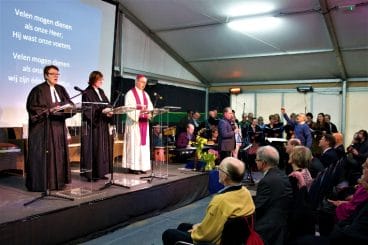
Apr 3, 2017 | Focolare Worldwide, Senza categoria
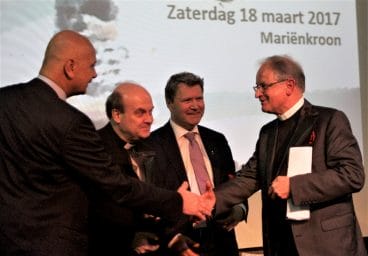 After the historic encounter between the World Lutheran Federation and the Catholic Church last October in Sweden, the 500th anniversary of the Reform has given rise to ecumenical events around the whole world. The March 18th On the Way to Unity Meeting was promoted by the Catholic Athanasios en Willibrord Association for Ecumenism and the Focolare Movement. The date chosen was meant to coincide with the departure of Chiara Lubich, whose commitment to Christian unity is famous. The encounter took place at the Focolare’s Marienkroon village, a hundred kilometres from Amsterdam. Three hundred and eighty people including prominent leaders of several Christian denominations attended. The event showed a people on the way, as the title of the event wished to express. A broad tent was set up that was filled to the brink, until an addition was added for the overflow crowd. The five-hour event included reflection, meals, testimonies, songs and artistic presentations. The highpoint was the moment of common prayer. The large turnout and the fraternal atmosphere created among all, including the leaders of the Churches, made the day seem historic as the director of the Catholic Association for Ecumenism, Geert van Dartel, affirmed. But it was also an “ecumenical feast,” one of the participants remarked.
After the historic encounter between the World Lutheran Federation and the Catholic Church last October in Sweden, the 500th anniversary of the Reform has given rise to ecumenical events around the whole world. The March 18th On the Way to Unity Meeting was promoted by the Catholic Athanasios en Willibrord Association for Ecumenism and the Focolare Movement. The date chosen was meant to coincide with the departure of Chiara Lubich, whose commitment to Christian unity is famous. The encounter took place at the Focolare’s Marienkroon village, a hundred kilometres from Amsterdam. Three hundred and eighty people including prominent leaders of several Christian denominations attended. The event showed a people on the way, as the title of the event wished to express. A broad tent was set up that was filled to the brink, until an addition was added for the overflow crowd. The five-hour event included reflection, meals, testimonies, songs and artistic presentations. The highpoint was the moment of common prayer. The large turnout and the fraternal atmosphere created among all, including the leaders of the Churches, made the day seem historic as the director of the Catholic Association for Ecumenism, Geert van Dartel, affirmed. But it was also an “ecumenical feast,” one of the participants remarked.  “Unity in diversity is not something that we can ‘fabricate’ on our own, but it is a gift from God,” warned Catholic Luther scholar, Hubertus Blaumeiser from the Focolare’s international Abba School centre for studies. Looking back at Lund’s ecumenical agenda, he cited a few words from Chiara Lubich: “The music gets written in Heaven.” It’s up to us to learn how to read that music. In any case, he went on, from the moment that Jesus gave his life for everyone on the cross, unity has been a given. Our task is to respond to that. This explains the first of five “ecumenical imperatives” that were signed in Lund, which recommend that we always begin from the perspective of unity and never separation. But what must be done so that this unity becomes concrete in the midst of oftentimes difficult situations after years of division? Placing ourselves behind the Triune God of Jesus, we are all called to an exodus,” said Blaumeiser, to go out of ourselves and learn to “think and live with the other as our starting point,” and that is “not only at the level of individuals, but also at the level of entire faith communities.” Ultimately, ecumenism is a process to be carried out with Jesus: from death to resurrection. “Unity begins wherever one has the courage to face the difficulty, to enter in with Jesus into the wounds of separation, welcoming one another even when that can be tiresome and difficult. The “ecumenical imperatives” say that we have to let ourselves be changed by the encounter with the other and thereby seek the visible unity [of Christians] and bear witness to the power of the Gospel together. The president of the Dutch Catholic Bishops Conference, Bishop Van den Hende; the General Secretary of the Protestant Churches of the Netherlands, Dr Reuver; and National Coordinator of the Pentecostal Community, Peter Sleebos, responded to those ideas. Commenting on the orientations that were described, they expressed further motives and thoughts, drawing on their own faith traditions. In the afternoon ecumenical testimonies were presented that illustrated what Chiara Lubich liked to call the “dialogue of life”. This was followed by an open discussion with the presenters. One participant commented: “This Saturday we managed to ‘play’ the beautiful notes of the music that is written in Heaven ‘together’.” “This meeting,” declared Pastor René De Reuver to the Catholic Journal, “was very special. I experienced the presence of Christ in the enthusiasm, in the communion and in the passion for union in Him. This doesn’t take away the differences, but leads us to enrich one another mutually.”
“Unity in diversity is not something that we can ‘fabricate’ on our own, but it is a gift from God,” warned Catholic Luther scholar, Hubertus Blaumeiser from the Focolare’s international Abba School centre for studies. Looking back at Lund’s ecumenical agenda, he cited a few words from Chiara Lubich: “The music gets written in Heaven.” It’s up to us to learn how to read that music. In any case, he went on, from the moment that Jesus gave his life for everyone on the cross, unity has been a given. Our task is to respond to that. This explains the first of five “ecumenical imperatives” that were signed in Lund, which recommend that we always begin from the perspective of unity and never separation. But what must be done so that this unity becomes concrete in the midst of oftentimes difficult situations after years of division? Placing ourselves behind the Triune God of Jesus, we are all called to an exodus,” said Blaumeiser, to go out of ourselves and learn to “think and live with the other as our starting point,” and that is “not only at the level of individuals, but also at the level of entire faith communities.” Ultimately, ecumenism is a process to be carried out with Jesus: from death to resurrection. “Unity begins wherever one has the courage to face the difficulty, to enter in with Jesus into the wounds of separation, welcoming one another even when that can be tiresome and difficult. The “ecumenical imperatives” say that we have to let ourselves be changed by the encounter with the other and thereby seek the visible unity [of Christians] and bear witness to the power of the Gospel together. The president of the Dutch Catholic Bishops Conference, Bishop Van den Hende; the General Secretary of the Protestant Churches of the Netherlands, Dr Reuver; and National Coordinator of the Pentecostal Community, Peter Sleebos, responded to those ideas. Commenting on the orientations that were described, they expressed further motives and thoughts, drawing on their own faith traditions. In the afternoon ecumenical testimonies were presented that illustrated what Chiara Lubich liked to call the “dialogue of life”. This was followed by an open discussion with the presenters. One participant commented: “This Saturday we managed to ‘play’ the beautiful notes of the music that is written in Heaven ‘together’.” “This meeting,” declared Pastor René De Reuver to the Catholic Journal, “was very special. I experienced the presence of Christ in the enthusiasm, in the communion and in the passion for union in Him. This doesn’t take away the differences, but leads us to enrich one another mutually.”
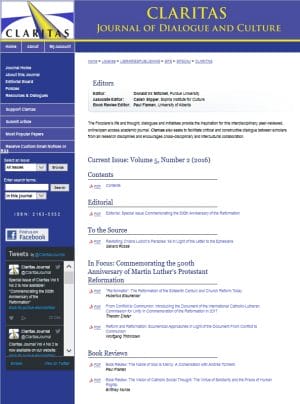
Mar 29, 2017 | Focolare Worldwide
 Courageous impulse towards ecumenical commitment. Catholics and Lutherans can walk together on a path towards a full reconciliation. 500 years have passed since Luther’s Reformation movement, the commemoration of which will last a year, starting from 30 October last year to 31 October 2017 (a symbolical date that recalls the publication in 1517, of the Ninety-Five theses of Luther on indulgences and justification, in Wittenberg). Inauguration events started with a meeting in the Lutheran Cathedral of Lund in Sweden, between Bishop Munib Younan, President of the World Lutheran Federation, and Pope Francis. On that occasion, the Pope had invited all Christians united by baptism, to announce together the Word of God, putting an end to all the century-old theological disputes that had separated the two Churches, and underlining the common gifts received thanks to dialogue and mutual listening. The Italian journal Nuova Umanità (New Humanity) dedicated its 221st edition to this event, focusing on the work entitled, “Half a millennium after Luther” (published in March 2016). Curated by Hubertus Blaumeiser, it presents the essays of a Lutheran theologian, Theodor Dieter, and a Catholic theologian, Wolfgang Thönissen. The historically important Lund event was preceded by the document, “From conflict to communion,” published in 2013 by the Lutheran–Catholic Commission for Unity, which works on behalf of the World Lutheran Federation and the Pontifical Council for the promotion of unity among Christians. The text indicates five “ecumenical imperatives” to definitively overcome the causes of disagreements and live a season of common commitment in mutual trust. The First imperative: Catholics and Lutherans strongly united by baptism should start always from the perspective of unity and not from the point of view of division, to strengthen what they have in common, instead of underlining and experiencing differences. The Catholic and Lutheran Churches, in the course of history have defined themselves through disagreements. Now there is need of the contrary, of the experience of encouragement and reciprocal criticism. Then comes the second imperative: continually letting oneself be transformed by the encounter with the other and the reciprocal witness of faith, through dialogue that opens to various ways and degrees of communion. The Third: renewed commitment of oneself to seek visible unity and elaborate and develop together the concrete steps this implies, and constantly strive towards this objective. The Fourth: rediscover together the power of the Gospel of Jesus Christ for our time. And lastly the fifth: the missionary task of ecumenism becomes greater inasmuch as our societies become pluralistic from the religious standpoint, and this is why together we have to bear witness to God’s mercy in the Gospel announcement and service to the world. The report ends by saying: «The beginnings of the Reformation will be remembered in an adequate and just manner when Lutherans and Catholics will listen to the Gospel of Jesus Christ together, and will once again let themselves be called to form a community together with the Lord.» The genesis and development of such a document was deepened in edition 223 of New Humanity, dedicated specifically to this decisive step for ecumenism. Following the trail of the Lund event and as a logical consequence of the “theoretical” answer given by the Ecumenical Council of Churches, at the end of February in the town of Ottmaring and characterised by an outstanding ecumenical calling, the President and Co-President of the Focolare, in the name of the entire Movement undertook the commitment to testify to and work for communion between the Churches beyond all divisions. «As a global movement with many members who are Christians of many Churches, and which is thus already living the experience of a people united by mutual love […] we recognise in the Lund meeting a true and proper kairos, a sign of God for our time, which pushes Christians to commit themselves even more, to make the testament of Jesus – that all may be one – a reality. »
Courageous impulse towards ecumenical commitment. Catholics and Lutherans can walk together on a path towards a full reconciliation. 500 years have passed since Luther’s Reformation movement, the commemoration of which will last a year, starting from 30 October last year to 31 October 2017 (a symbolical date that recalls the publication in 1517, of the Ninety-Five theses of Luther on indulgences and justification, in Wittenberg). Inauguration events started with a meeting in the Lutheran Cathedral of Lund in Sweden, between Bishop Munib Younan, President of the World Lutheran Federation, and Pope Francis. On that occasion, the Pope had invited all Christians united by baptism, to announce together the Word of God, putting an end to all the century-old theological disputes that had separated the two Churches, and underlining the common gifts received thanks to dialogue and mutual listening. The Italian journal Nuova Umanità (New Humanity) dedicated its 221st edition to this event, focusing on the work entitled, “Half a millennium after Luther” (published in March 2016). Curated by Hubertus Blaumeiser, it presents the essays of a Lutheran theologian, Theodor Dieter, and a Catholic theologian, Wolfgang Thönissen. The historically important Lund event was preceded by the document, “From conflict to communion,” published in 2013 by the Lutheran–Catholic Commission for Unity, which works on behalf of the World Lutheran Federation and the Pontifical Council for the promotion of unity among Christians. The text indicates five “ecumenical imperatives” to definitively overcome the causes of disagreements and live a season of common commitment in mutual trust. The First imperative: Catholics and Lutherans strongly united by baptism should start always from the perspective of unity and not from the point of view of division, to strengthen what they have in common, instead of underlining and experiencing differences. The Catholic and Lutheran Churches, in the course of history have defined themselves through disagreements. Now there is need of the contrary, of the experience of encouragement and reciprocal criticism. Then comes the second imperative: continually letting oneself be transformed by the encounter with the other and the reciprocal witness of faith, through dialogue that opens to various ways and degrees of communion. The Third: renewed commitment of oneself to seek visible unity and elaborate and develop together the concrete steps this implies, and constantly strive towards this objective. The Fourth: rediscover together the power of the Gospel of Jesus Christ for our time. And lastly the fifth: the missionary task of ecumenism becomes greater inasmuch as our societies become pluralistic from the religious standpoint, and this is why together we have to bear witness to God’s mercy in the Gospel announcement and service to the world. The report ends by saying: «The beginnings of the Reformation will be remembered in an adequate and just manner when Lutherans and Catholics will listen to the Gospel of Jesus Christ together, and will once again let themselves be called to form a community together with the Lord.» The genesis and development of such a document was deepened in edition 223 of New Humanity, dedicated specifically to this decisive step for ecumenism. Following the trail of the Lund event and as a logical consequence of the “theoretical” answer given by the Ecumenical Council of Churches, at the end of February in the town of Ottmaring and characterised by an outstanding ecumenical calling, the President and Co-President of the Focolare, in the name of the entire Movement undertook the commitment to testify to and work for communion between the Churches beyond all divisions. «As a global movement with many members who are Christians of many Churches, and which is thus already living the experience of a people united by mutual love […] we recognise in the Lund meeting a true and proper kairos, a sign of God for our time, which pushes Christians to commit themselves even more, to make the testament of Jesus – that all may be one – a reality. »
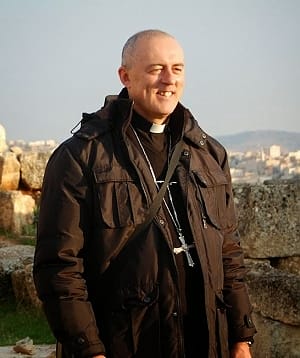
Mar 26, 2017 | Focolare Worldwide
 I arrived in Baghdad as the Apostolic Nuncio to Iraq and Jordan, two weeks after the terrible 2010 attack in the Syrian-Catholic cathedral that provoked the death of two priests, 44 faithful and five soldiers. Upon visiting the cathedral, one can imagine the desolation and I had the deep impression that I had been sent there to share that pain. The relationships between Christians and Muslims had been compromised for years, up to the point that also in the Nunciature, for any work or purchase only Christians were chosen. I felt I had to go against the current. I started to try learning Arab (unfortunately with little success!) to be able to greet everyone. When I was allowed, I would chat with the guards assigned to protect the Nunciature, at times sharing the dinner they prepared, even if the soldiers were not the best of cooks. The nun who acted as my interpreter did not agree too much with this, but I was convinced that something had to be done. I felt I had to “trust” even if this brought about some surprise. Once a Muslim barber to whom I started to go to have the hair in my ears removed, put a bit of gas from his lighter into my ear to burn the hair. I knew it was ingenuity on my part, but done on purpose in order to see the other person’s viewpoint. The only Muslim who worked in the Nunciature was the gardener. When I left he said to me: “So you are going, and I wish you could leave me a bit of your peace.” He probably had seen that it was an interior peace which only Jesus can give. Once when speaking to the gen (the youth of the Focolare), Chiara Lubich recalled the Emperor Constantine, who had seen a cross in the sky bearing the words: “In this sign you will conquer” – and said that our weapon is Jesus Forsaken and there is no other way for unity other than the cross. There Jesus had taken upon himself every division and separation, and rose from the dead. Also for us the defeat will be transformed into victory. In May 2015 I was transferred to Cuba. The preparations for Pope Francis’s visit were underway. All was proceeding well, but a small diplomatic incident at the last minute shook the preparation activities. And in a second I lost my interior peace, precisely in the presence of the Pope. Upon entering the Havana Revolution square for the solemn Mass, I saw the stylised picture of Che Guevara, with the words: “Hasta la victoria, siempre!” (Towards victory, always!). I immediately thought of the key of our victory: Jesus Forsaken. And I understood that I could not reach victory if not by passing through that defeat. Jesus could not resurrect without dying. Jesus Forsaken is not the instrument to be used in cases of necessity to solve our problems. He is the Spouse with whom we should be “one flesh.” And if I complain about something or someone, I realise that I am complaining about Him. I can’t say that I have chosen Him if I prefer not to have problems. I know that I should be happy when there are some rather than when there are none. So the problems, divisions, wars, poverty etc., no longer frighten me. I don’t live waiting for them to end soon, but in the hope that arises from the certainty that in Him these have already been resolved. So I live serenely and can transmit peace also to those who do not share my faith, like the gardener of the Nunciature in Baghdad.
I arrived in Baghdad as the Apostolic Nuncio to Iraq and Jordan, two weeks after the terrible 2010 attack in the Syrian-Catholic cathedral that provoked the death of two priests, 44 faithful and five soldiers. Upon visiting the cathedral, one can imagine the desolation and I had the deep impression that I had been sent there to share that pain. The relationships between Christians and Muslims had been compromised for years, up to the point that also in the Nunciature, for any work or purchase only Christians were chosen. I felt I had to go against the current. I started to try learning Arab (unfortunately with little success!) to be able to greet everyone. When I was allowed, I would chat with the guards assigned to protect the Nunciature, at times sharing the dinner they prepared, even if the soldiers were not the best of cooks. The nun who acted as my interpreter did not agree too much with this, but I was convinced that something had to be done. I felt I had to “trust” even if this brought about some surprise. Once a Muslim barber to whom I started to go to have the hair in my ears removed, put a bit of gas from his lighter into my ear to burn the hair. I knew it was ingenuity on my part, but done on purpose in order to see the other person’s viewpoint. The only Muslim who worked in the Nunciature was the gardener. When I left he said to me: “So you are going, and I wish you could leave me a bit of your peace.” He probably had seen that it was an interior peace which only Jesus can give. Once when speaking to the gen (the youth of the Focolare), Chiara Lubich recalled the Emperor Constantine, who had seen a cross in the sky bearing the words: “In this sign you will conquer” – and said that our weapon is Jesus Forsaken and there is no other way for unity other than the cross. There Jesus had taken upon himself every division and separation, and rose from the dead. Also for us the defeat will be transformed into victory. In May 2015 I was transferred to Cuba. The preparations for Pope Francis’s visit were underway. All was proceeding well, but a small diplomatic incident at the last minute shook the preparation activities. And in a second I lost my interior peace, precisely in the presence of the Pope. Upon entering the Havana Revolution square for the solemn Mass, I saw the stylised picture of Che Guevara, with the words: “Hasta la victoria, siempre!” (Towards victory, always!). I immediately thought of the key of our victory: Jesus Forsaken. And I understood that I could not reach victory if not by passing through that defeat. Jesus could not resurrect without dying. Jesus Forsaken is not the instrument to be used in cases of necessity to solve our problems. He is the Spouse with whom we should be “one flesh.” And if I complain about something or someone, I realise that I am complaining about Him. I can’t say that I have chosen Him if I prefer not to have problems. I know that I should be happy when there are some rather than when there are none. So the problems, divisions, wars, poverty etc., no longer frighten me. I don’t live waiting for them to end soon, but in the hope that arises from the certainty that in Him these have already been resolved. So I live serenely and can transmit peace also to those who do not share my faith, like the gardener of the Nunciature in Baghdad.

 Every year, spring blossoms a few days earlier in order to remember Chiara Lubich. March 14th is celebrated with a variety of new and annual events in every part of the world, each with a style all its own to remember the Focolare foundress on the anniversary of her death – or better – her birth to Heaven that happened in 2008. In 2017 this special day was interwoven with another event, the 50th anniversary of the New Families, which is a branch of the Focolare Movement that embraces 800 thousand families from around the world who strive to live the spirituality of unity and spread values of universal brotherhood in their local environments. The powerful title, Chiara Lubich and the Family, was meant to express the special care and attention the foundress gave to a “daring, beautiful and demanding” calling whose “immeasurable and precious values could change the world and transform it into a family, if those same values were applied to humankind.” “Here, in front of you, I seem to see Jesus who looks at the world, looks at the crowds and pities them,” Chiara Lubich had said in her historic founding address on July 19, 2967. “Because, of all the portions of the world, the most broken part has been placed on your shoulders, the part most like Jesus Forsaken. (…) May this pity not remain at the level of the sentiments, but be transformed into works.”
Every year, spring blossoms a few days earlier in order to remember Chiara Lubich. March 14th is celebrated with a variety of new and annual events in every part of the world, each with a style all its own to remember the Focolare foundress on the anniversary of her death – or better – her birth to Heaven that happened in 2008. In 2017 this special day was interwoven with another event, the 50th anniversary of the New Families, which is a branch of the Focolare Movement that embraces 800 thousand families from around the world who strive to live the spirituality of unity and spread values of universal brotherhood in their local environments. The powerful title, Chiara Lubich and the Family, was meant to express the special care and attention the foundress gave to a “daring, beautiful and demanding” calling whose “immeasurable and precious values could change the world and transform it into a family, if those same values were applied to humankind.” “Here, in front of you, I seem to see Jesus who looks at the world, looks at the crowds and pities them,” Chiara Lubich had said in her historic founding address on July 19, 2967. “Because, of all the portions of the world, the most broken part has been placed on your shoulders, the part most like Jesus Forsaken. (…) May this pity not remain at the level of the sentiments, but be transformed into works.”  Works that can now be seen: cultural projects, support for minors, seminars for families, help for separated couples, social and educaitonal projects that highlight universal family values from within the great human family. Concrete action is the main characteristic of a family, the basic cell of society, and this was strongly underscored in the two Synods that dealt with the topic of the family. The contents of those Synods then came together in Pope Francis’s Apostolic Exhortation, The Joy of Love. The joy of love that the pope speaks of is well represented by the thousands of voices and it is on the faces of the people and families that converged on Loppiano, Italy, from all five continents last March to attend the event, three days to learn the art of reciprocity. “Married life is like a ship,” one family from Peru commented, “if you try to row by yourself it takes a lot of effort.” It is the art of loving that gives strength to the family to regenerate, through trust, forgiveness, individual responsibility, creativity, acceptance and supportiveness.
Works that can now be seen: cultural projects, support for minors, seminars for families, help for separated couples, social and educaitonal projects that highlight universal family values from within the great human family. Concrete action is the main characteristic of a family, the basic cell of society, and this was strongly underscored in the two Synods that dealt with the topic of the family. The contents of those Synods then came together in Pope Francis’s Apostolic Exhortation, The Joy of Love. The joy of love that the pope speaks of is well represented by the thousands of voices and it is on the faces of the people and families that converged on Loppiano, Italy, from all five continents last March to attend the event, three days to learn the art of reciprocity. “Married life is like a ship,” one family from Peru commented, “if you try to row by yourself it takes a lot of effort.” It is the art of loving that gives strength to the family to regenerate, through trust, forgiveness, individual responsibility, creativity, acceptance and supportiveness.  The event at Loppiano was the pivot point for many other events around the world, beginning with last year’s January 27th inaugural event in Cairo, Egypt, and then for many successive events in Panama, Croatia, Italy, Uganda, Tanzania, USA, Brazil, France, Kenya, Panama, Lithuania, Australia, Belgium, Canada, Burundi, Singapore, and more. Practical experiences were presented and seminars on the themes of education, the relationship of the married couple, acceptance, stories from daily life and hidden acts of heroism in war zones, solidarity in moments of difficulty, support for disadvantaged populations, together with workshops, shows, festivals and public prayer services. Although it is difficult to list them all and describe the main characteristic of each one, it would be impossible not to recognize in these festive family gatherings in collaboration with other movements, Church, Religious and civil institution representatives –“seeds of communion for the people of the Third Millennium,” which were prophetically foretold by Chiara Lubich in 1993.
The event at Loppiano was the pivot point for many other events around the world, beginning with last year’s January 27th inaugural event in Cairo, Egypt, and then for many successive events in Panama, Croatia, Italy, Uganda, Tanzania, USA, Brazil, France, Kenya, Panama, Lithuania, Australia, Belgium, Canada, Burundi, Singapore, and more. Practical experiences were presented and seminars on the themes of education, the relationship of the married couple, acceptance, stories from daily life and hidden acts of heroism in war zones, solidarity in moments of difficulty, support for disadvantaged populations, together with workshops, shows, festivals and public prayer services. Although it is difficult to list them all and describe the main characteristic of each one, it would be impossible not to recognize in these festive family gatherings in collaboration with other movements, Church, Religious and civil institution representatives –“seeds of communion for the people of the Third Millennium,” which were prophetically foretold by Chiara Lubich in 1993. 








